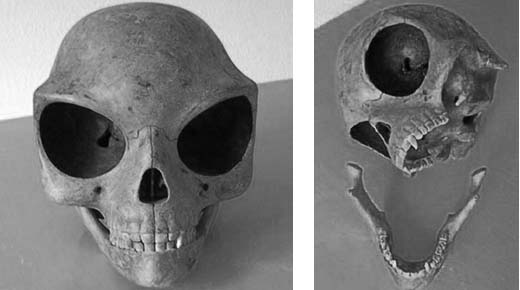10 things you should know about the ‘Alien-like’ Sealand Skull

There are some really bizarre things that have been discovered on Earth in recent decades.
It’s hard to differ authentic objects from elaborate hoaxes, but some discoveries like that of the Sealand Skull are proof that there are some things out there that simply put, cannot be explained rationally.
The Sealand skull is one of the most controversial skulls ever excavated and has revealed fascinating results that some believe are the ultimate evidence of Alien beings inhabiting Earth ni the distant past.
The Sealand skull is considered as one of the most mysterious skulls ever discovered. While some believe the enigmatic skull belonged to an Alien that visited Earth hundreds of years ago, others speculate it may have belonged to an unknown species that roamed parts of modern-day Denmark hundreds of years ago. Others, however, believe it is just another elaborate hoax.
Tests on the skull apparently revealed fascinating results indicating that the alien-like skull is perhaps one of the few inexplicable skulls ever discovered on Earth.
In this article, we bring you the most important things you should know bout the controversial Sealand skull.
The enigmatic alien-like skull was found in 2007 in Olstykke, Denmark by workers who were replacing sewer pipes.
The skull was examined for the first time ever in 2010 at the College of Veterinary Medicine in Denmark. Before that, not a single researcher wanted to examine the skull.
Tests results from 2010 revealed that the skull is one of the most mysterious craniums ever tested since experts were unable to explain what species it belonged to.
Since no one could shed light on the strange skull, the cranium was sent to the Niels Bohr Institute in Copenhagen. Carbon dating revealed that this mysterious being lived between 1200 and 1280 BC.
Hoping to find out more about the skull, researchers excavated the area where the skull was discovered. Among other things they discovered animal bones, stone axes, and other artifacts that according to researchers originated in the Neolithic period.
Some researchers speculate that due to the large eye sockets and the smooth surface, it is very likely that this being adapted to colder weather. The relative eye size suggests it was a nocturnal creature with giant eyes.
Strangely, the eyes sockets of the Sealand skull seem to extend further to the sides whereas in a human skull eyes are more centered. The nostril of the Sealand skull is very small, and the chin is very narrow.



 Creators of mankind
Creators of mankind Description of “Tall white aliens”
Description of “Tall white aliens” Where they came from?
Where they came from? About hostile civilizations
About hostile civilizations The war for the Earth
The war for the Earth “Tall white aliens” about eternal life
“Tall white aliens” about eternal life Video: “Nordic aliens”
Video: “Nordic aliens” Aliens
Aliens Alien encounters
Alien encounters The aliens base
The aliens base UFO
UFO Technology UFO
Technology UFO Underground civilization
Underground civilization Ancient alien artifacts
Ancient alien artifacts Military and UFO
Military and UFO Mysteries and hypotheses
Mysteries and hypotheses Scientific facts
Scientific facts


















